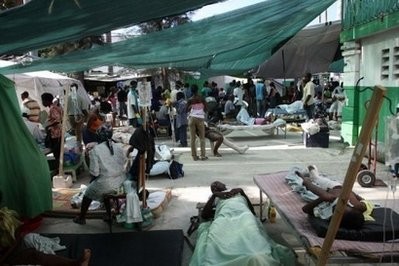Desperate Haiti quake survivors pleaded for vital supplies amid anger over the chaotic aid effort, while the true extent of the disaster beyond the capital began to emerge.
Four days after a 7.0-magnitude earthquake brought death and misery on an unprecedented scale to the impoverished and dysfunctional Caribbean nation, aid was trickling in but failing to reach many of those most in need.
US helicopters crews flew in and unloaded boxes of vital supplies as massive queues formed at distribution points where the UN's World Food Programme (WFP) handed out high-energy biscuits.Related article: First aid is small mercy at Haiti quake epicenter
An AFP journalist witnessed one US helicopter dropping a half-dozen small cartons into a stadium of starving Haitians, some brandishing machetes as they fought for the items.

As the fate of whole towns and villages around the capital in western Haiti remained unclear, the United Nations said it had never before faced such a humanitarian catastrophe.
"We have never been confronted with such a disaster in the UN memory. It is like no other," Elisabeth Byrs, spokeswoman of the UN Office for the Coordination of Humanitarian Affairs, told AFP in Geneva.Related article:Haiti quake 'worst disaster ever confronted by UN'
The destruction found Saturday in the town of Leogane, just 17 kilometers (10 miles) west of Port-au-Prince, was staggering -- street after street of homes and businesses torn apart.
"It's the very epicenter of the earthquake, and many, many thousands are dead," said WFP spokesman David Orr. "Nearly every house was destroyed here. The military are talking about 20,000 to 30,000 dead."
The latest overall toll from the Haitian government is at least 50,000 people dead and 1.5 million homeless, but those figures could soar once the full extent of the tragedy is known. Early estimates had spoken of 100,000 dead.
The UN said increasing numbers of Haitians were trying to cross the border into the Dominican Republic, to the east, and reported a surge of quake survivors fleeing to northern cities.
Crammed onto overflowing buses or on foot, thousands fled the flattened capital where the stench of decomposing bodies hung in the air and fears grew of angry riots.
"The streets smell of death," said Talulum Saint Fils, who sold her jewelry for one-way bus tickets for her husband and children out of Port-au-Prince.Related article:rescuers battle to find survivors
"I'd go to any place but away from this city," she told AFP. "There is no assistance of any kind, and our children simply cannot live like animals."
There were complaints of major coordination problems at the US-controlled airport in Port-au-Prince, the main destination for aid flights.
French Secretary of State for Cooperation Alain Joyandet said he had lodged an official complaint with the United States after a French plane carrying a field hospital was turned away. This was later denied by his own foreign ministry.
Secretary of State Hillary Clinton became the highest-ranking US official to visit Haiti since the quake and highlighted the urgent need to clear logistical hurdles.
"As President (Barack) Obama has said we will be here today, tomorrow and for the time ahead," she told Haitians.
"You have been severely tested, but I believe that Haiti can come back even stronger and better in the future."
Despite obvious organizational failures, a significant amount of aid was getting through, either through Port-au-Prince airport, by road from the Dominican Republic or from US helicopter flights.
Red Cross coordinator Mauricio Bustamante said the group had sent 15 planeloads of personnel and humanitarian aid, while a fleet of 19 choppers made regular air drops.
But after isolated reports Friday of machete-wielding gangs terrorizing survivors, there were growing signs Saturday of despondency and unease in a country with a checkered past of rioting and unrest.
Two Dominicans were seriously wounded after being shot Saturday as they handed out aid, local media in the Dominican Republic reported.
Exhausted police fired in the air in a vain attempt to scare off armed looters pillaging shops in the capital.
Barricades of burning tires, rubble and corpses blocked a main road out of the city as residents called for the dead bodies to be removed.
"They already took some bodies away, but there are more, many more," said Charles Weber, a 53-year-old voodoo priest in the crowd surrounding a roadblock.
UN chief Ban Ki-moon confirmed Saturday the death of his Haiti mission chief, Hedi Annabi, as the body faced its biggest ever loss of life with 40 dead and close to 330 unaccounted for. Ban was to visit Haiti Sunday.
The UN Security Council will meet Monday to discuss coordination of the international aid operation.
























